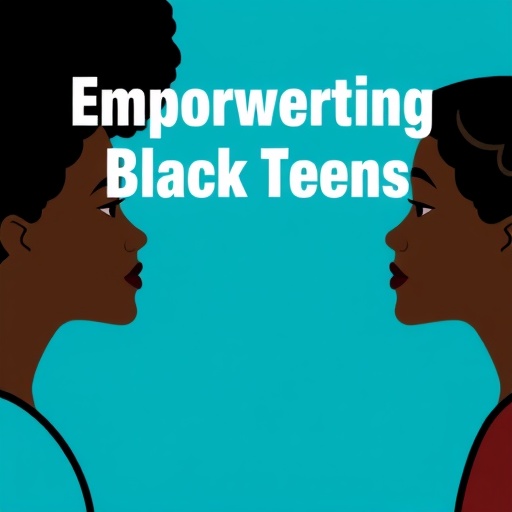In what many are considering a groundbreaking study, researchers are advocating for a seismic shift in the way social and emotional learning (SEL) is approached in educational settings, particularly for Black adolescents. This shift is not merely an increment in pedagogical techniques; it aims to transform the conversation around the lived experiences of these students, placing their voices at the forefront. Recent studies have suggested that traditional SEL programs often overlook the specific cultural contexts that significantly impact Black youth. This profound gap has serious implications for students’ engagement and the acceptability of content presented to them, ultimately influencing their overall educational outcomes.
The research highlights the importance of tailoring SEL frameworks to reflect the diverse cultural realities of Black adolescents, incorporating their unique perspectives into the curriculum. This initiative intends to create a more inclusive atmosphere in which these students can see themselves represented and valued in the educational narrative. Incorporating perspectives directly from the students themselves can lead to programs that resonate deeply and foster a sense of belonging and motivation.
Fostering emotional intelligence has gained mainstream attention in recent years, but the strategies employed often remain generic, applying a one-size-fits-all approach. This lacks the nuance necessary to affect meaningful change, as different cultures have varying approaches to emotional expression and social interaction. By centering Black adolescents’ viewpoints, educators are not only validating these students’ experiences but also enhancing the efficacy of SEL instruction.
Moreover, the research indicates that effective engagement goes far beyond the surface. It is not enough to merely include culturally relevant examples; the emotional needs and social realities of these young individuals must be acknowledged and integrated into the learning process. Students are more likely to engage with SEL when they can relate to the scenarios presented, recognizing their circumstances and cultural backgrounds in the material being taught.
The findings prompt educators and policymakers to reconsider their strategies and goals concerning SEL programs. This means moving away from a solely academic focus on emotional intelligence and mental wellness. Engaging children from Black communities requires understanding the sociopolitical factors that influence their lives, including systemic racism and inequality. Acknowledging these realities within educational settings is not just advantageous; it is imperative.
Importantly, the research emphasizes the role of collaborative learning environments. Educators who work to cultivate spaces where students feel safe and empowered to express their thoughts and emotions are likely to witness greater acceptance and willingness to engage with SEL curriculum. This can be achieved through participatory methods, in which educators and students work together to co-create learning experiences that resonate.
Additionally, the study draws on specific examples of how certain SEL frameworks can be enhanced by actively including student feedback. The traditional model of top-down curriculum development, where educators assume to know what students need without their input, can significantly stifle the efficacy of SEL programs. The importance of feedback loops – where student voices influence ongoing adaptations and improvements – cannot be overstated.
Another critical component of the work is the emphasis on educator training and development. While implementing SEL frameworks is essential, educators themselves must undergo training that teaches them how to engage effectively with diverse student populations. Ensuring that teachers are culturally competent and aware of their biases can lead to more successful engagements. Educators must be prepared to navigate these complex emotional landscapes and encourage open dialogue in their classrooms.
In examining the impact of these recommendations, the future of SEL looks promising. When institutions adopt an inclusive approach to SEL, they not only affirm the identities of Black adolescents but also improve the overall educational experience. This may lead to better mental health outcomes, increased academic performance, and decreased dropout rates, all of which are crucial for fostering a more equitable educational landscape.
Furthermore, as the implementation of these recommendations unfolds, subsequent research will be necessary to assess their long-term effects. Evaluating whether these culturally-tailored SEL programs genuinely resonate with Black adolescents and lead to substantial engagement is crucial for determining their success. Continuous feedback from participants will also provide opportunities for reflective practice among educators, allowing them to make informed changes.
The call to action presented by Hasselle et al. is a plea for systemic change, one that not only seeks to enhance educational experiences for Black adolescents but also strives to create a more equitable society. In acknowledging the inherent worth of these students’ perspectives, educational institutions can become catalysts for lasting change. The integration of justice and equity within SEL frameworks aligns not only with the needs of Black adolescents but also serves as a necessary step toward addressing larger societal inequities.
As we move forward, the challenge lies in ensuring that these proposed recommendations are not lost in bureaucratic inertia. Schools must take tangible steps to adopt practices that celebrate and prioritize the voices of Black adolescents in their curricula. By doing so, educational stakeholders will contribute to a future where every student feels seen, heard, and prepared to navigate the complexities of their emotional and social worlds.
Ultimately, this discourse around SEL is only just beginning. Through continued advocacy, research, and most importantly, listening to the lived experiences of Black adolescents, we pave the way for a transformative educational landscape. It is clear that the future of education must be inclusive, responsive, and deeply rooted in the realities of those it seeks to serve. The ripples of this research have the potential to create waves of change, reshaping educational paradigms for generations to come.
Subject of Research: The perspectives of Black adolescents on social emotional learning.
Article Title: Centering Black Adolescent’s Perspectives on Social Emotional Learning: Recommendations to Enhance Student Engagement and Content Acceptability.
Article References:
Hasselle, A.J., Renick, J., Moss, B.J. et al. Centering Black Adolescent’s Perspectives on Social Emotional Learning: Recommendations to Enhance Student Engagement and Content Acceptability.
School Mental Health (2025). https://doi.org/10.1007/s12310-025-09829-z
Image Credits: AI Generated
DOI: https://doi.org/10.1007/s12310-025-09829-z
Keywords: Social emotional learning, Black adolescents, educational equity, student engagement, cultural relevance.




